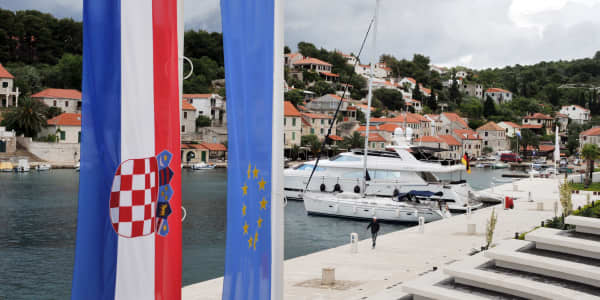Croatia's tourist board bills it as "a small country for great holidays" and countless sun-seeking northern Europeans—including Russian oligarch Roman Abramovich—will attest to the joys of vacationing on its stretch of the Mediterranean coast.
However, the European Union (EU) newcomer suffers the same economic malaise that hampers the longer-established holiday spots of Italy, Greece, Spain and Portugal. Its inefficient public sector has continued ballooning since the global financial crisis of 2008-09, while its economy languishes in recession and unemployment remains sky-high.
"Being Mediterranean, we are used to having more inefficiency than in colder places—it is the effect of living in southern places," quipped Andrej Grubisic, the founder of Grubisic and Partners, a financial advisory based in the Croat capital of Zagreb.
"There is a lot of warm blood and temperament and a lack of fiscal discipline."
Read MoreWhat killed Croatia's EU party?
Before the crisis, the Croatian economy grew at a healthy 4-5 percent annually, incomes doubled and economic and social opportunities dramatically improved. But the European financial downturn hit the country hard and Croatia is now in its sixth year of recession, having lost over 12 percent of output, according to the World Bank.
Unemployment remains stubbornly high, standing at 16.3 percent in May—the third-highest rate in the EU and well above the average of 10.3 percent, according to official statistics. And, Croatia's youth unemployment numbers read a painfully high 48.7 percent, trumping all peers bar Spain and Greece, where over-half of under-25s are unemployed.
Velimir Sonje, founder of Zagreb business advisory Arhivanalitika, blamed Croatia's economic stagnation on a long-standing lack of structural reforms, and said its problems were hidden by domestic demand expansion pre-2008.
"Croatia is traditionally a relatively expensive location for production, because wages and tax burdens are relatively high. So, price competitiveness was never Croatia's forte," he told CNBC via email.
In terms of international competitiveness, the former Yugoslav state was ranked 75 out of 144 countries by the World Economic Forum in both 2012 and 2013.
"From the beginning of the crisis, domestic demand did not recover and structural reforms lagged behind. The business environment is very rigid and labor regulation is as well, so Croatia was not able to compensate for a lack of price competitiveness by non-price competitiveness factors (like the overall business and investment climate)," said Sonje.
In common with the "Club Med" countries, political self-interest in Croatia, combined with entrenched union interests, has hindered progress in making unpopular reforms.
"A lack of any labor reform towards more flexible employment—a proven concept in other EU countries—is the primary underlying cause of persistent unemployment, combined with overall economic stagnation," Luka Oreskovic, an academic at Harvard University, told CNBC via email.
Read MoreWanna be in my gang: Is EU membership worth it?
Some experts point to Croatia's recent ascension to the EU (July last year) as grounds for economic hope.
"Some Croatian corporates have managed to expand and grow, despite the bleak domestic outlook, using the momentum of EU membership," said Oreskovic.
One example is Agrokor Group, a food and beverage retailer that is the largest private company in Croatia. It acquired Slovene rival Mercator for 544 million euros ($742 million) last month in a landmark deal.
Another unexpected champion is food processing and pharmaceutical company Podravka Group. It restructured from years of losses to net profitability of 200 million kuna ($36 million) in 2013, a 78 percent gain on the previous year.
"Companies like these two, that are showing strong growth despite the circumstances, will likely be the drivers of the eventual recovery in Croatia," said Oreskovic.




